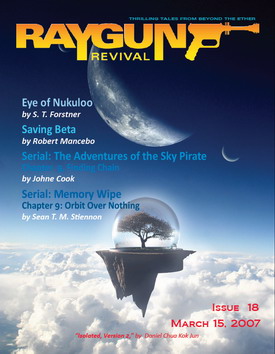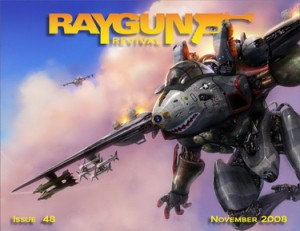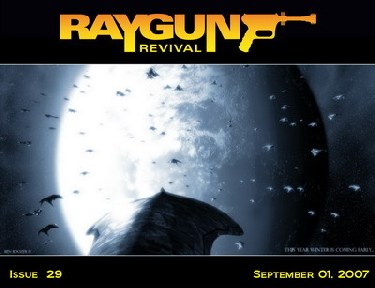You can find Part One of my interview with writer and editor Johne Cook HERE.
* * *
MIKE: From my perspective, there seems to be a lot of illusions about independent presses, the types of quality they will  “tolerate,” and the insular, perhaps “cliquish,” nature of their business. Johne, what are some of the most common myths or misunderstandings about independent presses?
“tolerate,” and the insular, perhaps “cliquish,” nature of their business. Johne, what are some of the most common myths or misunderstandings about independent presses?
JOHNE: Whenever you peer into a scene from the outside, it’s not unusual to draw inaccurate impressions or conclusions about the nature of the scene or the people who populate it. Honestly, from my perspective, there’s a bit of truth to the myths and misunderstandings.
For example, let’s talk about payment rates versus the quality of submissions. Perhaps I won’t astonish you with this observation — the more you can pay, the better the submissions. We put the best face on it, but there it is.
When RGR started, we were aware of the bias in the minds of some (many?) authors against submitting to a strictly 4theluv outfit, so we started by paying a nominal $10 rate for stories, and ramped all the way up to $15 (whee!) for awhile after that. Despite being nearly nothing, there was an observable uptick in attention by paying something rather than nothing, even though the end result was nearly equal.
Now that we’re paying semi-pro rates (thanks to our gracious hosts at Every Day Publishing), we’re seeing much bigger names in the slushpile. SF legend Mike Resnick even wrote a new Catastrophe Baker story just for RGR, based in his career-spanning Birthright Universe of stories! We’re working on landing a story from Kevin J. Anderson.
As an idealist, we really loved working with first-time authors, mentoring them as writers and showing them the ropes of our favorite genre. As a pragmatist, I can tell you that the signal-to-noise ratio is much better among established writers.
MIKE: There was a time when digital publications were viewed as second tier. Having a story published in an ezine did not carry the clout that a hard mag did. Is that still true? Or have digital imprints gained more respect in the industry?
JOHNE: Yes, but times are changing as we speak. The once-venerable dead tree publishers are the ones who are now backpedaling and trying to adapt. The big three didn’t used to accept online submissions, but that’s started to change. They still carry the panache, but the buzz is clearly with writers selling their works in the digital or audio arena. Writers who started in ‘zines are starting to win some of the really big awards. The ‘zines strike me as venerable farm clubs for big league ball teams. People in the know perk up if you say you’ve been published in some of my favorite ‘zines. For instance, John Scalzi cut his sci-fi teeth at Strange Horizons. Clarkesworld Magazine has risen from obscurity to Hugo award winning zine in a few short years. There’s a definite trend toward respectability for some of the digital publications, however, it’s like anything else. Some outfits will keep doing what they do with no apparent change, some will follow the trends, and a smaller percentage will elevate themselves from the herd. As you might expect, who earns respect and who doesn’t is a healthy mix of hard work, good timing, and simple hard work. Not everybody will make it to the next level.
MIKE: As you know, a lot of writers who frequent my site are Christians, but are unhappy with the current content being labeled “Christian fiction.” They love speculative fiction, but want “faith” elements in their stories without the ultra conservative strictures or preachiness. Does Raygun Revival publish books and stories with “spiritual / religious” themes and, if so, what advice would you give to writers of such a genre?
JOHNE: RGR does not publish Christian fiction. With that said, space opera is very much about embracing stories with a strong moral discussion, with discernable good guys (or aliens) and bad guys (or  aliens). That’s one of the things I most liked about Star Wars – there was no doubt who were the good guys and who were the bad guys. In Firefly, Joss Whedon, a self-professed Atheist, was able to talk about religion without being brandished as Christian fiction. He simply wrote a story that allowed for a myriad of characters with a multitude of perspectives, and one of them, Shepherd Derrial Book, was a devout Christian with a dangerous past who served as the spiritual guide and conscience for Captain Mal Reynolds.
aliens). That’s one of the things I most liked about Star Wars – there was no doubt who were the good guys and who were the bad guys. In Firefly, Joss Whedon, a self-professed Atheist, was able to talk about religion without being brandished as Christian fiction. He simply wrote a story that allowed for a myriad of characters with a multitude of perspectives, and one of them, Shepherd Derrial Book, was a devout Christian with a dangerous past who served as the spiritual guide and conscience for Captain Mal Reynolds.
That’s what we look for at RGR, adventure stories that sometimes feature a character of belief, who can talk about the success and failure (or benefits or dangers) of religion from the outside, where most sci-fans live. Timothy Zahn gave us my favorite example of doing this right back in the day with his novel Deadman Switch (1988, Baen), which featured a first person story narrated by Gilead Raca Benedar, a Watcher with a hyper-keen eye for detail (not unlike Sherlock Holmes) who is practically telepathic. He’s highly respected, and also a devout Christian. (There are relatively few Christians at that time because of a purge at some point in our history.) The story focuses on the science fiction side of things while using religious differences to help drive the conflict. It was, first and foremost, a rigorous science fiction story that happened to feature a character of Christian persuasion as part of the largely story, not in place of the larger story.
At RGR, that’s as far as we go. We love stories that have moral elements, moral conflict, but stay away from stories that explicitly exist for the purpose of proselytizing. We prefer discussions of the numinous to be organic rather than strident or didactic.
MIKE: What are some of the indie presses that you most admire and believe are putting out some of the best stuff?
JOHNE: From a sci-fi perspective, in no particular order, I like Clarkesworld Magazine, Strange Horizons, Electric Velocipede, Andromeda Spaceways Inflight Magazine, Orson Scott Card’s Intergalactic Medicine Show, the now defunct Jim Baen’s Universe, Nate Lilly’s Spacewesterns, and the stories published online from  Tor.com.
Tor.com.
From the side that talks about sci-fi from a Christian perspective, Jeff Gerke’s Marcher Lord Press is doing some really exciting stuff. Chila Woychik’s Port Yonder Press is looking intriguing and promising. I love Relief Journal and The Midnight Diner. And I’d be remiss if I didn’t mention Grace Bridge’s Splashdown Books, Lyn Perry’s Residential Aliens and Digital Dragon magazine from Tim Ambrose and Randy Streu.
MIKE: Finally, what advice would you give to someone who wants to start a indie operation? Aside from the money — no small thing indeed — what factors should the entrepreneurial small presser consider before diving in?
JOHNE: In no particular order, here’s what I’m thinking of right off the top of my head:
- Vision – Honestly, from our perspective, the money isn’t nearly as important as a fierce clarity of vision. Clarify your vision as soon as possible. We started without any funds at all but we had a unified vision right out of the gate, and that bore us through a host of weird times and hard knocks.
- Network – Rub shoulders with other operators doing roughly what you want to do. Get help as soon as you can. Tim Ambrose asked me for five minutes and I chatted with him about the failures and successes we saw trying to launch RGR on and off for three weeks. Lyn Perry bent my ear when he was thinking about his publication. We learned from those who went before us, and love to share what we’ve learned with others who are up-and-coming.
- Community – Engage your community, pull yourself up by your bootstraps. We put up forums for RGR six months before the magazine went live, and by the time the first issue hit, we had a core of rabid, engaged fans.
- Unique – Find one or two things that make your outfit unique and play it up. At RGR, we are known for phenomenal cover art, a fun pulp adventure fiction genre, and the faux arrogance of the Overlords and our Big Red Button.™ Finding some things that make you different will give you a sense of identity and help set you apart from other similar groups.
- Fun – By all that’s holy, enjoy what you’re doing. If the project’s not fun, I’d seriously question if you should be undertaking such a mammoth undertaking.
* * *
If you haven’t yet, please check out RayGun Revival. And if you’d like to find out more about Johne Cook, you can hook up with him through both Facebook and Twitter. Terrific stuff, Johne! Thanks so much for visiting.














Great interview, Mike and Johne! Just a clarification: the speculative fiction Port Yonder Press hopes to publish in the next few years will be almost exclusively crossover rather than Christian. Jeff and Grace are doing fine jobs with the Christian stuff. We need a place for those who can write good crossover spec fic.
Thanks!
Chila
I’ve known about RGR for a while now, but never really had an interest in checking it out. After reading the interview, and seeing the wonderful cover art, I decided to finally give it a go. So far, I love it. High quality stories, nice layout, fun all around.
I had no idea it was so professional. . .but to be fair, the last time I briefly checked in was. . .well. . .forever ago.
Great interview. Great site.
Thanks, for the clarification, Maggie!
Thanks, Tony. Really appreciate it.
Mike,
I know your interviews generally inspire the fewest comments from me, but that is because they are so rich and detailed (good questions lead to great answers) that they give me a ton to think about and even more to act upon!
Please continue them. They are always, consistently high quality, amazing stuff.